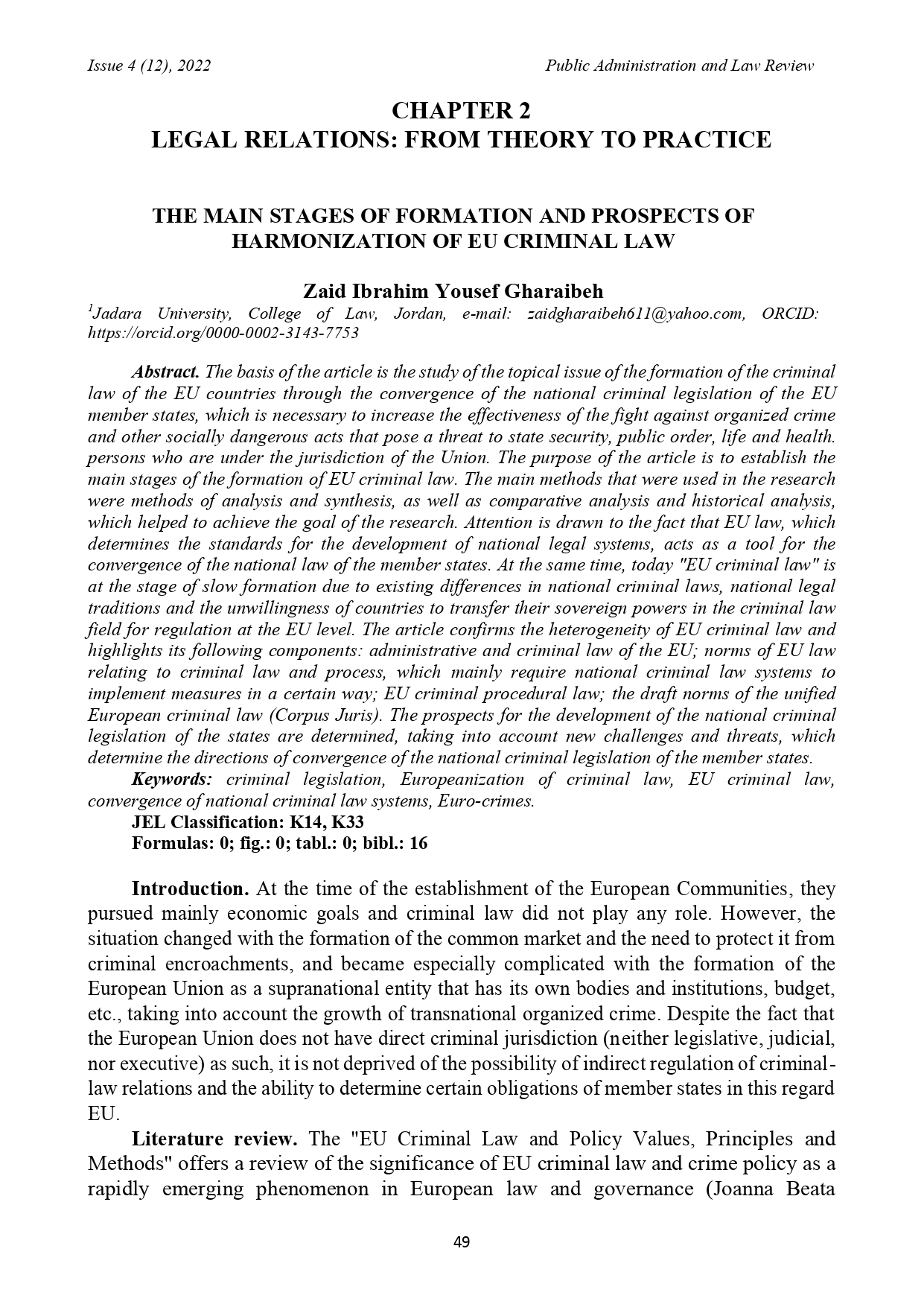THE MAIN STAGES OF FORMATION AND PROSPECTS OF HARMONIZATION OF EU CRIMINAL LAW
DOI:
https://doi.org/10.36690/2674-5216-2022-4-49Keywords:
criminal legislation, Europeanization of criminal law, EU criminal law, convergence of national criminal law systems, Euro-crimesAbstract
The basis of the article is the study of the topical issue of the formation of the criminal law of the EU countries through the convergence of the national criminal legislation of the EU member states, which is necessary to increase the effectiveness of the fight against organized crime and other socially dangerous acts that pose a threat to state security, public order, life and health. persons who are under the jurisdiction of the Union. The purpose of the article is to establish the main stages of the formation of EU criminal law. The main methods that were used in the research were methods of analysis and synthesis, as well as comparative analysis and historical analysis, which helped to achieve the goal of the research. Attention is drawn to the fact that EU law, which determines the standards for the development of national legal systems, acts as a tool for the convergence of the national law of the member states. At the same time, today "EU criminal law" is at the stage of slow formation due to existing differences in national criminal laws, national legal traditions and the unwillingness of countries to transfer their sovereign powers in the criminal law field for regulation at the EU level. The article confirms the heterogeneity of EU criminal law and highlights its following components: administrative and criminal law of the EU; norms of EU law relating to criminal law and process, which mainly require national criminal law systems to implement measures in a certain way; EU criminal procedural law; the draft norms of the unified European criminal law (Corpus Juris). The prospects for the development of the national criminal legislation of the states are determined, taking into account new challenges and threats, which determine the directions of convergence of the national criminal legislation of the member states.
Downloads
References
Mitsilegas, V., Bergström, M., & Konstadinides, T. (Eds.). (2016). Research Handbook on EU Criminal Law. Cheltenham, UK: Edward Elgar Publishing. Retrieved Nov 15, 2022, from https://www.elgaronline.com/view/edcoll/9781783473304/97817834733
Joanna Beata Banach-Gutierrez, Christopher Harding (2017). EU Criminal Law and Policy Values, Principles and Methods. 276 p.
G. Vermeulen, W. De Bondt, C. Ryckman, Rethinking International Cooperation in Criminal Matters in the EU, Moving beyond actors, bringing logic back, footed in reality, Antwerp: Maklu, 2012.
Rethinking European Criminal Justice, coordinated by the Max Planck Institute and funded by OLAF for 2006- 2007, Freiburg.
Study coordinated by the University of Luxembourg and funded by OLAF on EU model rules of evidence and procedural safeguards for the procedure of the proposed European Public Prosecutor’s Office, 2012 and EU model rules of criminal investigations and prosecution for the procedure of the proposed European Public Prosecutor’s office, 2011-2012.
See K. Ligeti (ed.) The Future of Prosecution in Europe, vol. 2, Oxford: Hart Publishing, forthcoming, 2018; K. Ligeti (ed.), The Future of Prosecution in Europe, vol. 1, Oxford: Hart Publishing, 2013, pp. 945 - 985.
S. Allegrezza, V. Covolo, The Directive 2012/13/EU on the Right to Information in Criminal Proceedings: Status Quo or Step Forward?, Croatian Association of European Criminal law, 2016, pp. 41-51; I-M. Rusu, The right to information within the criminal proceedings in the European Union. Comparative examination. Critical opinions. Judicial Tribune, Vol 6, special issue, 2016, pp. 139-150.
E-J. Van Der Vlis, The right to interpretation and translation, The Journal of Specialised Translation, Issue 14, 2010, pp. 26-40; E. Hertog, Directive 2010/64/EU of the European Parliament and of the Council on the Right to Interpretation and Translation in Criminal Proceedings: Transposition Strategies with regard to Interpretation and Translation, MonTI, Vol 7, 2015, pp. 73-100;
S. Quattrocolo, The Right to Information in EU Legislation, in S. Ruggeri (ed), Human Rights in Criminal Law: New Developments in European Legislation and Case Law after the Lisbon Treaty, New York: Springer International Publishing, 2015; R. Vogler, Lost in Translation: Language Rights for Defendants in European Criminal Proceedings, in S. Ruggeri 2015, op. cit., pp. 96-108.
V. Mols, Bringing directives on procedural rights of the EU to police stations: Practical training for criminal defence lawyers, New Journal of European Criminal Law, Vol 8, No 3, 2017, pp. 300-308; A. Soo, How are the member states progressing on transposition of Directive 2013/48/EU on the right of access to a lawyer? An inquiry conducted among the member states with the special focus on how Article 12 is transposed, New Journal of European Criminal Law, Vol 8, No 1, 2017, pp. 64-76.
M. Kusak, Common EU Minimum Standards for Enhancing Mutual Admissibility of Evidence Gathered in Criminal Matters, European Journal of Criminal Policy Research, Vol 23, 2017, pp. 337-352
A. Bernardi, A. Martufi (eds), Prison overcrowding and alternatives to detention. European sources and national legal systems, Naples: Jovene Edirore, 2016.
See E. Vergès, Emergence européenne d’un régime juridique du suspect, une nouvelle rationalité juridique, Revue de Science Criminelle, 2012, p. 635.
See I-M. Rusu, The right to information within the criminal proceedings in the European Union. Comparative examination. Critical opinions. Judicial Tribune, Vol 6, special issue, 2016, pp. 139-150.
G. Laura Candito, The Influence of the Directive 2012/13/EU on the Italian System of Protection of the Right to Information in Criminal Procedures, in Ruggeri 2015 op. cit., pp. 229-261.
P. Caiero (ed), The European Union Agenda on Procedural Safeguards for Suspects and Accused Persons: the ‘second wave’ and its predictable impact on Portuguese law, Law Institute, University of Coimbra, 2015.

Downloads
Published
How to Cite
Issue
Section
License
Copyright (c) 2022 Zaid Ibrahim Yousef Gharaibeh

This work is licensed under a Creative Commons Attribution 4.0 International License.





